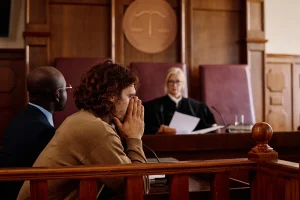At DiDonato & Burke Law Firm, we believe that understanding Miranda Rights is crucial for every citizen. With our extensive experience serving the Philadelphia and Bucks County communities, we’ve seen firsthand how knowledge of these rights can make a significant difference in legal outcomes.
What are Miranda Rights?
As criminal defense attorneys, we often explain to our clients what Miranda Rights are. These rights, also known as the Miranda Warning, are a set of constitutional protections that law enforcement must inform suspects of before conducting custodial interrogations. They stem from the Fifth Amendment’s protection against self-incrimination and the Sixth Amendment’s right to counsel.
Typically, the Miranda Warning includes:
- You have the right to remain silent.
- Anything you say can and will be used against you in a court of law.
- You have the right to an attorney.
- If you cannot afford an attorney, one will be appointed for you.
While the exact wording may vary slightly depending on the jurisdiction, the core message remains consistent.
The Origin of Miranda Rights
The concept of Miranda Rights originated from the 1966 Supreme Court case Miranda v. Arizona. At DiDonato & Burke, we’ve studied this case extensively as it forms the foundation of many of our defense strategies. In this landmark case, Ernesto Miranda was arrested and interrogated without being informed of his rights. He confessed to a crime, but the Supreme Court ruled that his confession was inadmissible because he wasn’t aware of his rights during the interrogation.
This decision led to the establishment of the Miranda Warning, which is now a crucial part of our criminal justice system.
When Do Miranda Rights Apply?
In our practice, we often encounter confusion about when Miranda Rights come into play. It’s important to understand that Miranda Rights must be read when two conditions are met:
- The suspect is in police custody.
- The police intend to interrogate the suspect.
We’ve handled many cases where Miranda Rights didn’t apply because these conditions weren’t met. For instance, if an officer asks you questions during a routine traffic stop or in a public place where you’re free to leave, they’re not required to read you your rights.
The Importance of Invoking Your Rights
As your potential legal representatives, we can’t stress enough the importance of knowing how to use your Miranda Rights effectively. If you’re ever questioned by the police, remember that you have the right to remain silent and the right to an attorney. These Miranda laws rights are designed to protect you from self-incrimination.
In our experience, it’s best to clearly state, “I am invoking my right to remain silent” if you choose to do so. Similarly, if you want to speak with an attorney, you should clearly say, “I want to speak with an attorney.” We’ve seen cases where unclear invocation of rights led to complications in court.
Common Misconceptions About Miranda Rights
Over our years of practice, we’ve encountered several misconceptions about Miranda Rights that we’d like to clear up:
- Myth: If you’re not reading your Miranda Rights, your case will be dismissed. Fact: While evidence obtained from an un-Mirandized interrogation may be inadmissible in court, it doesn’t automatically lead to case dismissal.
- Myth: Police must read Miranda Rights immediately upon arrest. Fact: Miranda Rights only need to be read before custodial interrogation, not necessarily at the time of arrest.
- Myth: Once you’ve waived your Miranda Rights, you can’t invoke them later. Fact: You can invoke your Miranda Rights at any time during questioning, even if you initially waived them.
The Consequences of Waiving Miranda Rights
As your potential legal advisors, we generally recommend exercising caution when considering waiving your Miranda Rights. We’ve seen cases where statements made without legal representation were misinterpreted or taken out of context in court.
Remember, the miranda rules and rights are designed to protect you throughout the entire process, not just at the beginning. If you do choose to speak with the police, you can stop the interview at any time and request an attorney.
Miranda Rights and Juveniles
At DiDonato & Burke, we also handle juvenile cases and want to emphasize that Miranda Rights apply to minors as well as adults. However, courts often consider a juvenile’s age, experience, education, background, and intelligence when determining if they truly understood their rights when waiving them.
We advise parents to ensure their children understand their Miranda Rights and the importance of exercising them if ever questioned by the police.
Contact Our Philadelphia Criminal Defense Lawyer
As attorneys at DiDonato & Burke Law Firm, we’ve seen how crucial understanding Miranda Rights is for every citizen. These rights are a vital protection against self-incrimination and ensure you’re aware of your constitutional protections during police encounters.
Remember, knowing what Miranda Rights are is just the first step. It’s equally important to understand when they apply, how to invoke them effectively, and the potential consequences of waiving them. By being well-informed about your rights, you can better navigate interactions with law enforcement and protect your legal interests.
While we hope you never find yourself in a situation where you need to invoke your Miranda Rights, being prepared and knowledgeable can make a significant difference if such a situation does arise. Always remember, when in doubt, it’s best to remain silent and request an attorney.
With our long history of serving the Philadelphia and Bucks County communities, DiDonato & Burke Law Firm is here to provide legal guidance. If you need assistance with your case or have questions about your Miranda Rights, don’t hesitate to consult with us. Our team is committed to ensuring that your rights are protected and that you receive the best possible legal representation.
Contact DiDonato & Burke Law Firm today for a consultation. Your rights matter, and we’re here to defend them.



